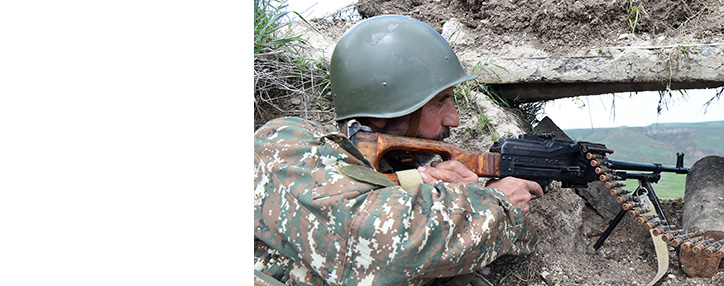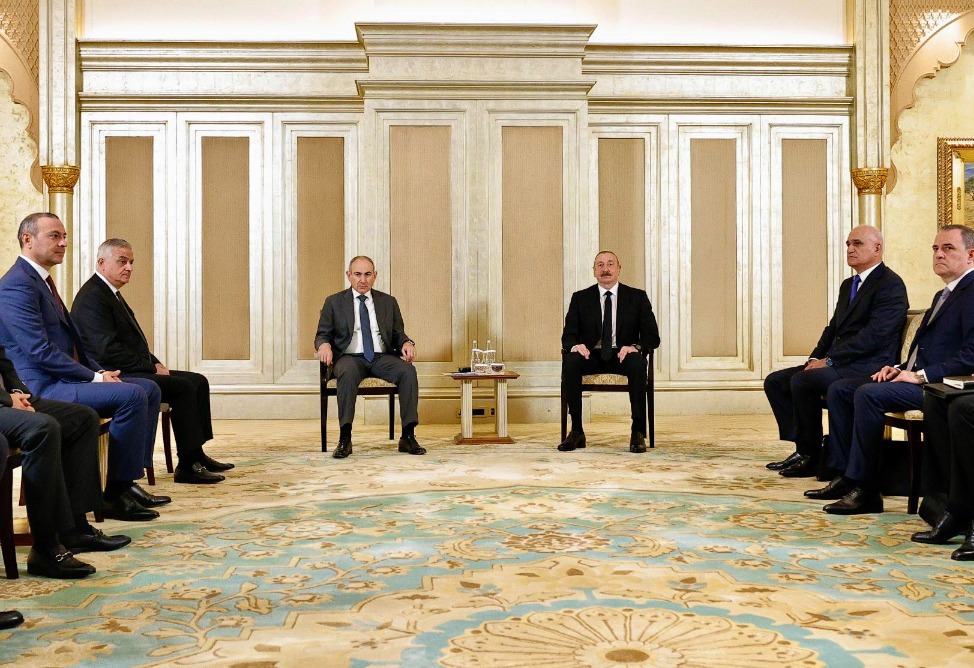Russia will respect the decision of Yerevan and Baku to have Karabakh involved in peace process, Lavrov says
07.06.2018,
17:27
Russian Foreign Minister Sergey Lavrov said today if the parties to the Nagorno-Karabakh conflict (Armenia and Azerbaijan) agree at some stage that Nagorno-Karabakh should be also involved in the talks, the Russian side will respect this decision.

YEREVAN, June 7. /ARKA/. Russian Foreign Minister Sergey Lavrov said today if the parties to the Nagorno-Karabakh conflict (Armenia and Azerbaijan) agree at some stage that Nagorno-Karabakh should be also involved in the talks, the Russian side will respect this decision.
On May 9, Armenian Prime Minister Nikol Pashinyan told a press conference in Stepanakert that the Karabakh conflict could not be resolved without the direct participation of its authorities in the negotiations, saying also that only Karabakh authorities have the right to speak on behalf of its people.
"If the official Yerevan and Baku agree at some stage that Nagorno-Karabakh should be again involved in the talks, we will respect this decision. As for the Minsk Group, its work has been going on for many years. Representatives of Nagorno-Karabakh used to participate in this process, but then, the parties agreed to change the format of the talks,’ Lavrov said at a joint news conference with Armenian Foreign Minister Zohrab on Thursday in Moscow.
At the same time, the Russian foreign minister stated that the Russian position on this issue has remained unchanged.
"It has always been a position that the Karabakh issue should be resolved through the OSCE Minsk Group. We are convinced that this is the best possible format," Lavrov said. He also noted that Russia, as one of the co-chairs of the OSCE Minsk Group together with the French and Americans, is pursuing a common, consistent, non-contradictory line on creating conditions that would allow Baku and Yerevan to forge out a peace formula.
The Nagorno-Karabakh conflict erupted into armed clashes after the collapse of the Soviet Union in the early 1990s as the predominantly Armenian-populated enclave of Azerbaijan sought to secede from Azerbaijan and declared its independence backed by a successful referendum.
On May 12, 1994, the Bishkek cease-fire agreement put an end to the military operations. A truce was brokered by Russia in 1994, although no permanent peace agreement has been signed.
Since then, Nagorno-Karabakh and several adjacent regions have been under the control of Armenian forces of Karabakh. Nagorno-Karabakh is the longest-running post-Soviet era conflict and has continued to simmer despite the relative peace of the past two decades, with snipers causing tens of deaths a year.
On April 2, 2016, Azerbaijan launched military assaults along the entire perimeter of its contact line with Nagorno-Karabakh. Four days later a cease-fire was reached. -0---
On May 9, Armenian Prime Minister Nikol Pashinyan told a press conference in Stepanakert that the Karabakh conflict could not be resolved without the direct participation of its authorities in the negotiations, saying also that only Karabakh authorities have the right to speak on behalf of its people.
"If the official Yerevan and Baku agree at some stage that Nagorno-Karabakh should be again involved in the talks, we will respect this decision. As for the Minsk Group, its work has been going on for many years. Representatives of Nagorno-Karabakh used to participate in this process, but then, the parties agreed to change the format of the talks,’ Lavrov said at a joint news conference with Armenian Foreign Minister Zohrab on Thursday in Moscow.
At the same time, the Russian foreign minister stated that the Russian position on this issue has remained unchanged.
"It has always been a position that the Karabakh issue should be resolved through the OSCE Minsk Group. We are convinced that this is the best possible format," Lavrov said. He also noted that Russia, as one of the co-chairs of the OSCE Minsk Group together with the French and Americans, is pursuing a common, consistent, non-contradictory line on creating conditions that would allow Baku and Yerevan to forge out a peace formula.
The Nagorno-Karabakh conflict erupted into armed clashes after the collapse of the Soviet Union in the early 1990s as the predominantly Armenian-populated enclave of Azerbaijan sought to secede from Azerbaijan and declared its independence backed by a successful referendum.
On May 12, 1994, the Bishkek cease-fire agreement put an end to the military operations. A truce was brokered by Russia in 1994, although no permanent peace agreement has been signed.
Since then, Nagorno-Karabakh and several adjacent regions have been under the control of Armenian forces of Karabakh. Nagorno-Karabakh is the longest-running post-Soviet era conflict and has continued to simmer despite the relative peace of the past two decades, with snipers causing tens of deaths a year.
On April 2, 2016, Azerbaijan launched military assaults along the entire perimeter of its contact line with Nagorno-Karabakh. Four days later a cease-fire was reached. -0---



